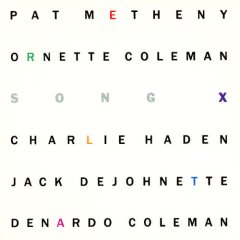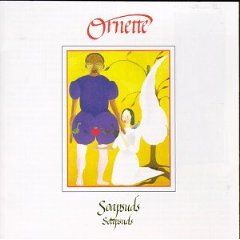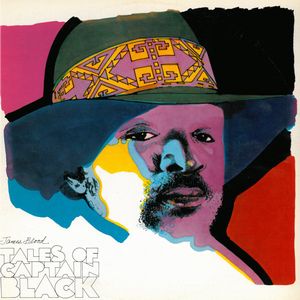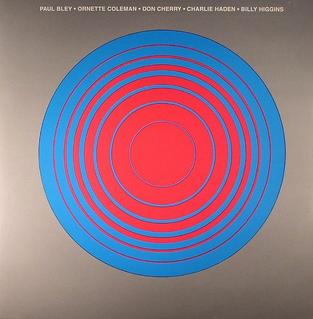
Jamaaladeen Tacuma is an American jazz funk avant-garde bassist, composer and producer born in Hempstead, New York. He was a bandleader on the Gramavision label and worked with Ornette Coleman during the 1970s and 1980s, mostly in Coleman's Prime Time band.

The Shape of Jazz to Come is the third album by the jazz musician Ornette Coleman. Released on Atlantic Records in 1959, it was his debut on the label and his first album featuring the working quartet including himself, trumpeter Don Cherry, bassist Charlie Haden, and drummer Billy Higgins. The recording session for the album took place on May 22, 1959, at Radio Recorders in Hollywood, California. Although Coleman initially wished for the album to be titled Focus on Sanity after the LP's fourth track, Atlantic producer Nesuhi Ertegun suggested the final title, feeling that it would give consumers "an idea about the uniqueness of the LP."

In All Languages is a 1987 double album by Ornette Coleman. Coleman and the other members of his 1950s quartet, trumpeter Don Cherry, bassist Charlie Haden, and drummer Billy Higgins, performed on one of the two records, while his electrified ensemble, Prime Time, performed on the other. Many of the songs on In All Languages had two renditions, one by each group.

Dancing in Your Head is a studio album by Ornette Coleman, released in 1977 by Horizon Records.

Liberation Music Orchestra is a band and jazz album by Charlie Haden released in 1970, Haden's first as a band leader.

Sound Grammar is a live album by jazz saxophonist and composer Ornette Coleman, recorded live in Ludwigshafen, Germany, on 14 October 2005. The album was produced by Coleman and Michaela Deiss, and released on Coleman's new Sound Grammar label. It was his first new album in almost a decade, since the end of his relationship with Verve in the 1990s. It features a mix of new and old originals.

Song X is a collaborative studio album by American jazz guitarist Pat Metheny and saxophonist Ornette Coleman. It is a free jazz record that was produced in a three-day recording session in 1985. The album was released in 1985 by Geffen Records.

Skies of America is the 17th album by jazz saxophonist Ornette Coleman, released on Columbia Records in 1972. It consists of one long composition by Coleman taking up both sides of the album, played by the London Symphony Orchestra and conducted by David Measham. Coleman himself only plays on a few segments, and there is no other jazz instrumentation.

Tomorrow Is the Question!, subtitled The New Music of Ornette Coleman!, is the second album by American jazz musician Ornette Coleman, originally released in 1959 by Contemporary Records. It was Coleman's last album for the label before he began a highly successful multi-album series for Atlantic Records in 1959.

Fort Yawuh is a jazz album by American pianist and composer Keith Jarrett. Originally released in 1973 by Impulse! Records, it marks the beginning of the label’s relationship with Jarrett. Recorded live at the Village Vanguard on February 24, 1973 by Jarrett's "American Quartet": Dewey Redman on tenor saxophone, Charlie Haden on acoustic bass, Paul Motian on drums, plus percussionist Danny Johnson. The title of the album is an anagram of "Fourth Way," a reference to George Gurdjieff's fourth path of self-awareness.

Of Human Feelings is an album by American jazz saxophonist, composer, and bandleader Ornette Coleman. It was recorded on April 25, 1979, at CBS Studios in New York City with his band Prime Time, which featured guitarists Charlie Ellerbee and Bern Nix, bassist Jamaaladeen Tacuma, and drummers Calvin Weston and Coleman's son Denardo. It followed the saxophonist's failed attempt to record a direct-to-disc session earlier in March of the same year and was the first jazz album to be recorded digitally in the United States.

Soapsuds, Soapsuds is an album of duets by saxophonist/trumpeter Ornette Coleman and bassist Charlie Haden, recorded in 1977 and released on the Artists House label.

Tales of Captain Black is an album by American guitarist James Blood Ulmer, featuring Ornette Coleman, Jamaaladeen Tacuma, and Denardo Coleman, recorded in 1978 and originally released on the Artists House label. It was coproduced by Ornette. The album was remastered and rereleased on CD with a new mix by Joe Ferla approved and co-produced by Ulmer on the Japanese DIW label in 1996.

Dinner Music is an album by American composer, bandleader and keyboardist Carla Bley, recorded in 1976 and released on the Watt/ECM label in 1977.

Tone Dialing is an album recorded in 1995 by the American jazz composer and saxophonist Ornette Coleman and his Prime Time ensemble. It was released in September 1995 by Coleman's Harmolodic record label, in partnership with Verve/PolyGram. It was the Harmolodic label's first release, and "the first disc fully devoted to Coleman's music in eight years."

Colors: Live from Leipzig is a live album by the American jazz composer and saxophonist Ornette Coleman and German pianist Joachim Kühn recorded in 1996 and released on the Harmolodic/Verve label.

Sound Museum: Hidden Man is an album by the American jazz composer and saxophonist Ornette Coleman recorded in 1996 and released on the Harmolodic/Verve label. It is dedicated to Don Cherry and Ed Blackwell.

Sound Museum: Three Women is an album by the American jazz composer and saxophonist Ornette Coleman recorded in 1996 and released on the Harmolodic/Verve label. It is dedicated to Don Cherry and Ed Blackwell.

Friends and Neighbors: Live at Prince Street is a live album by the American jazz saxophonist and composer Ornette Coleman recorded in 1970 and released on the Flying Dutchman label.

Live at the Hilcrest Club 1958 is a live album by pianist Paul Bley, saxophonist Ornette Coleman, trumpeter Don Cherry, drummer Billy Higgins and bassist Charlie Haden recorded in California in 1958 and released on the Inner City label in 1976. The album was the first live recording of Ornette Coleman, made shortly after he recorded his first album, Something Else!!!! and featuring the group that would soon record the Atlantic albums The Shape of Jazz to Come (1959) and Change of the Century (1960).




















